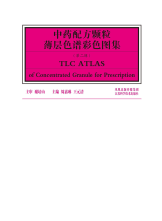
主要责任者: 周嘉琳等
责任方式: 主编
出版者: 江苏科学技术出版社
出版地: 南京
页码: 1-172
开本: 16
中图分类号: R282-64
分辑名:第二辑
语种:中
定价:158.00(精)
出版时间:2011-02
丛书多卷书否:是
书目简介:本册工具书共收录156条词条。
| 词条 | 中药配方颗粒薄层色谱彩色图集 |
| 类别 | 中文百科知识 |
| 释义 |  主要责任者: 周嘉琳等 责任方式: 主编 出版者: 江苏科学技术出版社 出版地: 南京 页码: 1-172 开本: 16 中图分类号: R282-64 分辑名:第二辑 语种:中 定价:158.00(精) 出版时间:2011-02 丛书多卷书否:是 书目简介:本册工具书共收录156条词条。 |
| 随便看 |
开放百科全书收录579518条英语、德语、日语等多语种百科知识,基本涵盖了大多数领域的百科知识,是一部内容自由、开放的电子版国际百科全书。